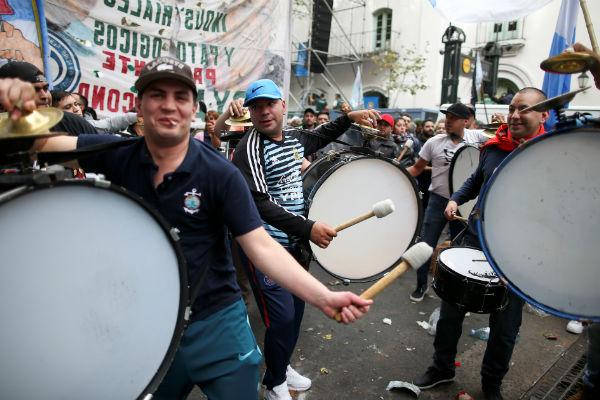Slam President Mauricio Macri for subsidy cuts

BUENOS AIRES (Reuters) — Argentine labour unions staged a 24-hour nationwide strike on Tuesday against President Mauricio Macri’s fiscal austerity program, blocking streets in the capital Buenos Aires and shutting down traffic in the city centre.
The protests partially paralyzed government offices, schools, banks and airports as opposition to Macri’s belt-tightening policies raised fresh doubts about his bid for re-election in October.
A proponent of free markets, Macri came to office in 2015 as a favorite among business leaders and investors.
Opinion polls show him losing popularity as he raises taxes and cuts public utility subsidies as part of his effort to erase the primary fiscal deficit under his government’s US$56 billion standby lending agreement with the International Monetary Fund.
"This president is dangerous!" Pablo Micheli, head of the CTA umbrella labour group shouted to a sea of protesters gathered in Buenos Aires’ Plaza de Mayo. "We must hold more strikes and marches to keep these guys from taking any more away from us." Argentina’s previous leader, Cristina Fernandez, a free-spending populist who increased government’s role in the economy, has been gaining popularity and may run for the presidency again in October.
Macri campaigned on promises of "normalizing" the economy after eight years of government intervention in the markets under Fernandez.
"To go back to the past would be self destruction. It would mean sacrificing two or three more generations," Macri said in an address on Tuesday at an event outside the capital.
The peso hit a record low on Friday, ending a tough week for local markets buffeted by anxiety over Argentina’s recession, 54% inflation and the upcoming election.
The peso got a 3.37 per cent boost on Monday after the central bank said it may increase dollar sales in the foreign exchange market to control the slide of the local currency, which lost 2.12 per cent of its value against the dollar in April.
The peso inched up another 0.18 per cent on Tuesday to close the session at 44.29 per dollar. But the country’s economic outlook remained murky as poverty increases and business chokes on benchmark interest rates of nearly 74 per cent.



